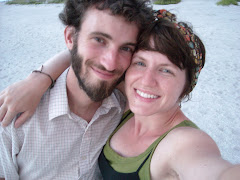Lately I've been noticing a problem with the terminology used to describe our program. I understand why it's easier to call our program reforestation because that's what the world wants to hear. People want to know that other people are reforesting land by simply planting trees and not ever cutting them down. Unfortunately, it's not that simple. The other day someone asked, "It sounds like your program is agroforestry and not reforestation, is that true?" I thought for a moment and said "yes."
Dictionary.com provides this enlightenment:
re·for·est: to replant (an area) with forest cover.
re'for·es·ta'tion: n. the restoration (replanting) of a forest that had been reduced by fire or cutting. v. (used with object) to replant trees on (land denuded by cutting or fire).
ag·ro·for·est·ry: a method and system of land management involving the simultaneous cultivation of farm crops and trees; agriculture incorporating the growing of trees. Agroforestry ensures a continuous food supply, some continuous economic return, and the avoidance of soil degradation.
And courtesy of Wikipedia, there's also
sustainable forest management (SFM): the stewardship and use of forests and forest lands in a way, and at a rate, that maintains their biodiversity, productivity, regeneration capacity, vitality and their potential to fulfill, now and in the future, relevant ecological, economic and social functions, at local, national, and global levels, and that does not cause damage to other ecosystems.
I think agroforestry fits us better than reforestation, and we're not yet at the whole-forest level of SFM. Maybe each of the definitions fit us in some way, but which one sounds sexier and which will get funding? Reforestation, of course.
I just feel sometimes like we are misleading people. Our supporters think we plant trees which hang out in the ground and grow, and everyone is happy. Most of the Haitians who plant MCC trees cut some of those trees every year to make money. They make charcoal, harvest firewood, mill lumber for building, etc. I get a little agitated (just a bit) when people think that we shouldn't let them cut trees. The people in our communities still need to make a living, and I think it's awesome and amazing that we have arrived at a program that both reforests the land and grants people a way to achieve some financial independence at the same time.
From now on we will have to reference this project as the KSM (Komite Santral Menonit) Reforestation, Agroforestry, and Sustainable Forestry Program. And in Haiti acronyms never make a pronounceable word so we can call it MCC/KSM RASFP. Easy, eh?
I guess that's it for now, even though now I feel like one of those people that are always trying to explain their very technical job to someone and eventually just say "I work with computers."
I plant trees.
Bryan
Thursday, March 19, 2009
Subscribe to:
Post Comments (Atom)


3 comments:
Hey Bryan . . . this post, esp the part about cutting/not cutting really captures my feeling about the program too. It took me a while to figure out that it was wrong to say: "don't cut trees." The program is way more about providing an additional economic opportunity. The trick is the management of the farmers' tree resources. I love thinking about trees as a crop, just like diri or mayi, etc.
Keep up the great work!
Matt
I really appreciate the information about your program. I am always eager to hear more details about what MCC is doing around the world. You've given me a new innovative ecological word to study: agroforestry. It is funny to consider the reaction against cutting trees. It's like when we teach 3rd graders in the US about deforestation. We make it sound like cutting a tree is evil no matter the situation. Try imaginig a world where we didn't any tree based products. Obviously, we have a lot of work to do, the world over, in order to get people using sustainable practices, but never cutting down trees is probably not one of them.
Hmmm ... I know the feeling. "I publish books in China." It makes it sound soooo simple! Thanks for letting us in a little on the complexity. I really, really appreciate that your work is giving the community independence. That is AWESOME!
Post a Comment